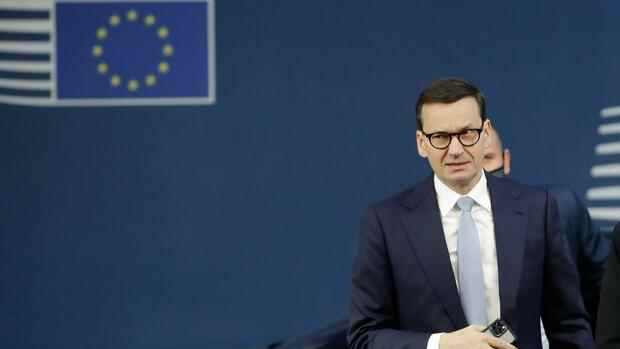“When they start World War III, we will defend our rights with all means at our disposal.”
(Photo: dpa)
The tone is now so rough that it is hardly possible to tighten it further. In the dispute over the dismantling of the rule of law in Poland, the Polish Prime Minister Mateusz Morawiecki warned the EU of a “Third World War” in a newspaper interview. “If they start the Third World War, we will defend our rights with all means available to us,” Morawiecki told the Financial Times.
The martial language shows the seriousness of the situation. The conflict between Poland and the EU is not just about abstract values and principles, it is also about money, a whole lot in fact. For weeks, the EU Commission has been holding back allocations from the reconstruction fund, with which Europeans want to fight the consequences of the pandemic and promote future investments. The fund comprises a total of 750 billion euros.
In the coming years, the money is to be gradually paid out to the member states – on the condition that the respective governments implement certain reforms. Poland has applied for € 24 billion in grants and € 12 billion in loans. Money that the government no longer wants to wait for. But the Commission, which has to examine the national reform and investment plans, is under considerable pressure from Parliament to withhold the funds for Poland. The same applies to Hungary, where the government has also undermined the rule of law.
The EU does not want funds to seep away in corrupt channels
The concern: Without an independent judiciary, European money threatens to seep into corrupt channels, which would jeopardize the legitimacy of the entire project. In order to prevent this from happening, the EU states, together with the reconstruction funds, have also agreed on a “conditionality mechanism”. It gives the EU the opportunity to financially penalize violations of the rule of law. Parliament insists that the Commission use this new instrument to punish Poland and Hungary.
Top jobs of the day
Find the best jobs now and
be notified by email.
But the Brussels authority is maneuvering. It was originally agreed in the EU that the conditionality mechanism would only be applied once the European Court of Justice had ruled on its legality. A few weeks ago, however, the head of the Commission, Ursula von der Leyen, signaled that the first steps were being prepared, probably also to appease the angry MPs and to avert a complaint by Parliament against the Commission for failure to act. The latest twist at the EU summit on Friday: Von der Leyen admitted to waiting for the judgment of the European Court of Justice.
The Parliament has now given the Commission an ultimatum: if the mechanism has not been used by November 2nd, the failure to act will be brought.
For its part, the Polish government accuses the EU Commission of breaking European law by neither approving nor rejecting the corona aid. “The later we get it, the greater the evidence of this discriminatory treatment and the dictation-like approach of the EU Commission,” Morawiecki grumbled in the Financial Times.
The dispute between Brussels and Warsaw was further intensified recently by a ruling by the Polish Constitutional Court, according to which essential parts of European law are not compatible with Poland’s constitution. This decision could allow the national-conservative PiS government to ignore unpopular judgments of the European Court of Justice. The common legal basis, the foundation of the EU, is thus called into question.
A spokesman for the EU Commission did not want to comment on the sharp rhetoric of the Polish government on Monday. He just stressed that the European Union had contributed to lasting peace. There is no room for war rhetoric.
More: Poland wants to save its coal production by nationalization – and risks another dispute with Europe.
